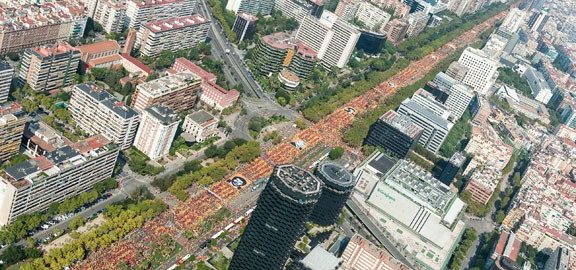10.09.2018 - 13:25
|
Actualització: 10.09.2018 - 15:25
Every country proudly celebrates its national day every year, but since 2012 Catalonia’s ‘Diada’, on September 11, has also seen mass demonstrations in which millions of Catalans have taken to the streets in favour of independence. On Tuesday, people from all over the country will once again come together in their hundreds of thousands in central Barcelona for this year’s demonstration to demand a say on their political future.
Organized by the grassroots, pro-independence organization, the Catalan National Assembly (ANC in Catalan), this year’s protest, dubbed ‘Diada per la República’ (National Day for the Republic), already has over 400,000 people who signed up. “There are already 440,000 people inscribed, 270,000 protest t-shirts sold and 1,500 full buses” ANC head, Elisenda Paluzie told on Monday morning. Up to a million Catalans turned out for last year’s demonstration.
One year on from the referendum
Yet, this year’s event will be different than in previous years, as it will be the first since last autumn’s independence bid, which saw a unilateral referendum held on October 1, which was followed by a declaration of independence in Parliament on October 27.
That led to the imposition of direct rule on Catalonia, the firing of the government, the jailing of officials involved in organizing the referendum, while other political leaders avoided arrest by going abroad, where some still remain, including former president, Carles Puigdemont.
Support for those officials who are unable to return or who are awaiting trial will be a main focus of Tuesday’s demonstration. Over the weekend, president Quim Torra called on the public to make September 11 this year, “historic.”
Measure of support for independence
Moreover, given the political tensions in the country in the past year, which has seen unionist parties fiercely campaigning against secession, and the independence camp determined to continue in its push for a republic, the turnout at the demonstration will serve to measure the strength of support in the country for secession.
Following the October 1 referendum last year, support for independence in Catalonia rose to 48.7%, according to a poll carried out by the Centre for Opinion Studies, which was a 7.6 point increase compared to a similar poll conducted before the referendum took place.
International interest
Another key aim of the annual September 11 protest is to publicize Catalonia’s political situation to the wider world, as the pro-independence camp claim the conflict is a European crisis and not simply an internal matter for Spain.
This year will see the participation of foreign lawyers Ben Emmerson, who is representing jailed and exiled Catalan leaders to the United Nations, and Aamer Anwar, who successfully represented former minister Clara Ponsatí in her fight against extradition from Scotland.
Anwar was invited to speak at the demonstration by the ANC in July, after which he tweeted that it would be “an honor” to attend. After receiving his invitation, Emmerson said he would try to give at least part of his speech in Catalan, as he had “learned a bit” of the language.
The size of the demonstration is also likely to generate interest among the international media, which have widely reported the event in previous years. The idea this time is for the hundreds of thousands present to create a huge human wave through the city center.


